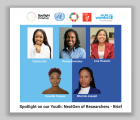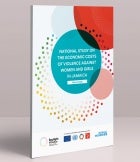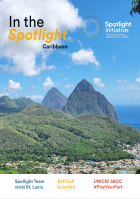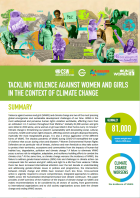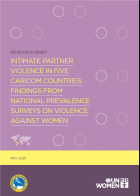1 - 20 of 34 Results
Pagination
Date:
Violence Against Women and Girls (VAWG) has economic costs for individuals (e.g., victims and their children), families, communities and society at-large. Several countries have estimated the costs of VAWG, in an effort to understand the economic impacts of VAWG on the national economy and to determine investments needed to lessen, if not eliminate VAWG.
Date:
These guidelines are intended to help improve the quality of administrative data on VAWG, and the ethical practices which attend the collection of this data. Accordingly, the primary audience is those entities which produce administrative data on VAWG at the national and sub-national levels.
Date:
UN Women MCO in its role as the lead agency for Data and Research under the EU-UN Spotlight Initiative Programme facilitated the opportunity for four young Caribbean women to develop and strengthen their skills in data collection and analysis but more importantly, to contribute to an initiative which empowers young women and girls, works towards achieving gender equality, and addresses VAWG in Caribbean societies.
Date:
The National Strategic Action Plan on Gender-Based Violence and Sexual Violence 2023 – 2027 of Trinidad and Tobago is an evidence-based strategy that seeks to eliminate gender-based violence and sexual violence within the national community while enhancing the rights and safety of all women, girls, men and boys
Date:
Violence Against Women and Girls (VAWG) has economic costs for individuals (e.g., victims and their children), families, communities and society at-large. Several countries have estimated the costs of VAWG, in an effort to understand the economic impacts of VAWG on the national economy and to determine investments needed to lessen, if not eliminate VAWG.
Date:
The EU-UN Spotlight Trinidad and Tobago Programme is being implemented with special focus in Tunapuna/Piarco, Mayaro/Rio Claro and Tobago. The TT Spotlight Newsletter Issue 5 focuses on several of recent issues and events including a donation to the TTPS's VWSU, the role of culture and art in addressing GBV, and a campaign to support the Children's Authority.
Date:
This issue of the Spotlight Regional Programme Newsletter showcases the work that has steadily progressed for the first six months of this year.
Date:
VAWG is the most widespread and pervasive human rights violation worldwide, affecting more than an estimated one in three women throughout their lifetime. Climate change is threatening our planet’s sustainability with devastating social, cultural, economic, health and human rights impacts, affecting women and girls disproportionately, especially the most marginalized groups
Date:
This issue brings to you encouraging messages from three of the Heads of UN agencies involved in the Caribbean Regional Spotlight Initiative, as we work together to end the scourge that is violence against women and girls.
Date:
The briefs included in this package aim to present in a friendly way the essential strategies for addressing violence against women in general, preventing violence, and providing services to survivors in particular. The last brief includes a compilation of resources developed by UN Women and partners to end violence against women and girls.
Date:
UN Women’s tenth anniversary publication, “A decade of daring”, celebrates the milestones of the organization’s first 10 years.
Date:
Prevalence of VAWG in the Caribbean is among the highest in the world. VAWG has proven to be so entrenched and normalized that both men and women have a high tolerance for its manifestations, particularly when perpetrated in the context of intimate partner relationships. Data from a variety of sources confirm that even young people hold these views, raising concerns about the intergenerational transmission of VAWG.
Date:
Women’s Health and Life Experiences: A Qualitative Research Report on Violence Against Women in Grenada, 2018
Date:
Authors/editor(s): CLAUDIA NICHOLSON; HALIMAH DESHONG The Grenada Women’s Health and Life Experiences Study 2018 Report has produced, for the first time, nationally representative data on the prevalence of violence against women and girls in Grenada. The Grenada WHLES comprised a cross-sectional survey and qualitative research – interviews and focus group discussions – that were conducted in 2018 to ascertain the prevalence of violence against women and girls (VAWG) in...
Date:
Gender-based violence (GBV) violence shelters 4 are safe places where survivors of intimate partner, domestic, and/or family violence can get help and temporary housing. GBV shelters provide critical support, immediate protection, safe emergency shelter, and longer-term transitional housing. Because of the nature of the shelters, survivors of violence may reside in proximity, for either a limited or extended period...
Date:
When compared to other regions, the number of CARICOM cases have been few, but are increasing. It will be necessary to develop and implement programmes and policies that will support inclusive socio-economic stability while efforts are made to contain the spread of the virus.
Date:
From 2016 to 2018, five CARICOM Member States conducted National Prevalence Surveys on Gender-based Violence. This report examines the processes used to collect data in the region, highlights the key takeaways from survey implementation, captures context-specific experiences in collecting data on VAWG and presents the key lessons learned from the countries’ experiences. Funded by UN Women, UNDP, USAID, the Inter-American Development Bank and the Caribbean Development Bank, the surveys...
WOMENS HEALTH AND LIFE EXPERIENCES A QUALITATIVE RESEARCH REPORT ON VIOLENCE AGAINST WOMEN IN GUYANA
Date:
The overall aim of this research was to contribute contextual information to the Women’s Health and Life Experiences Survey (WHLES) to explain the “why” and “how” of Guyanese women’s experiences of violence in their relationships.
Date:
The Guyana Women’s Health and Life Experiences Survey 2018 is the first report to provide a comprehensive examination of the nature and prevalence of violence against women and girls in Guyana.
Date:
Agenda 2030’s commitment to “leave no one behind” requires an ambitious and highly disaggregated data collection effort by every government and multilateral entity.



